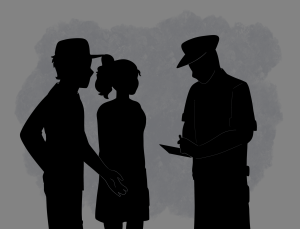Movie Review: “Beasts of No Nation” features remarkable acting, bleak premise
November 17, 2015
“Sun, why are you shining at this world? I am wanting to catch you in my hands, to squeeze you until you can not shine no more. That way, everything is always dark and nobody’s ever having to see all the terrible things that are happening here.”
So says Agu, the young lead of Cary Fukunaga’s film “Beasts of No Nation,” played by the very young actor Abraham Attah, who had no previous experience. Attah’s chillingly effective portrayal of a child soldier in a war-torn West African country serves as a reminder that, as much as many of us cringe upon seeing child actors in film, when they’re good, they are often shockingly powerful.
“Beasts” is a rather unusual movie, even outside of its content. The film, released in mid-October, did not get a wide theatrical release. Instead, it was released directly to Netflix, the first film to premiere on the streaming giant rather than theaters or video-on-demand. This unusual release made the film widely accessible to far more people than most specialty films: according to “The Guardian,” “Beasts” had obtained over three million views just 11 days following its release, significantly above the estimated ticket sales of widely-released cinematic Oscar hopefuls “The Walk” and “Steve Jobs” (based on BoxOfficeMojo’s data).
The film itself, based on a book by Uzodinma Iweala, tells the story of Agu, a young boy who is unable to leave his home before it is attacked by government troops, who massacre the village. Fleeing, Agu is found by a battalion of rebels, made up mostly of young children, who coerce him into becoming a soldier among their ranks. Under the direction of the ruthless Commandant (played by Idris Elba, the film’s only star), Agu is led to perform increasingly violent and disturbing acts, losing track of both time and his age as he enters into a twisted form of manhood.
With such a bleak and uncomfortable premise, “Beasts” ran the risk of alienating its audience; however, the strong acting and memorable characterizations keeps viewers hooked. Attah and the other novice actors never give any indication of their inexperience, with their dialogue flowing naturally and their emotions portrayed with sincerity. Agu’s fear, rage, self-loathing, and occasional moments of childish joy are expressed masterfully. Elba, as the Commandant, fits right in, creating a figure who is charismatic, intimidating, and manipulative, but yet, in another sense, just as immature as the children he’s leading into a war.
The film’s scenario is fictional, featuring an unnamed country in Western Africa and the generically-named rebel group “Native Defense Force.” In this manner, the film depoliticizes itself, and subsequently devotes itself more closely to the portrayal of Agu’s experience. It achieves a striking feel of realism, which is boosted by the film’s stunning cinematography. Fukunaga (who did triple duty as the film’s director, screenwriter, and cinematographer) captures both the lush jungle in which the soldiers hide and the ruined villages where the soldiers do battle. It’s a veritable feast for the eyes – if the viewer can bear to watch.
It should be noted that the film is not entirely bleak. The opening contains humorous moments with Agu in his childhood innocence, and flashes of his true, good-hearted nature appear sporadically throughout his time with the rebels. The film also features the rather amusing image of an army of rebels being forced to wait in a lounge, sitting and sleeping on couches, while waiting for an appointment. Finally, while I would be loath to spoil the film’s ending, it does finish off with a glimmer of hope for the young soldiers.
It’s bitterly ironic that “Beasts of No Nation” did not receive a true theatrical release, as it is very much a cinematic affair, more so than some films that actually do make it to theaters. This is not a film that should be watched on an iPhone; find the biggest screen you have and use it. I highly recommend the film to any audience that can handle it; it’s not an easy sit, but it’s a powerful one, with the same sort of horrific quality that made “12 Years A Slave” such a powerful film two years ago.






